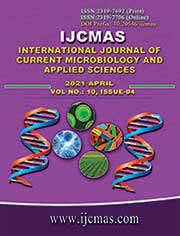


 National Academy of Agricultural Sciences (NAAS)
National Academy of Agricultural Sciences (NAAS)

|
PRINT ISSN : 2319-7692
Online ISSN : 2319-7706 Issues : 12 per year Publisher : Excellent Publishers Email : editorijcmas@gmail.com / submit@ijcmas.com Editor-in-chief: Dr.M.Prakash Index Copernicus ICV 2018: 95.39 NAAS RATING 2020: 5.38 |
Fecal sludge (FS) and septage is an assimilation of excreted night soil and black water. Primarily being a human waste, FS constitutes enormous genera of microbes, opportunistic pathogens, and parasitic cysts. The World Bank data revealed it has a potent to cause about a lakh of diarrheal decease every annum in India within the age group of zero to five. With the catastrophic consequences, mismanagement of fecal sludge is undoubtedly a hazard to wholesome sanitation. Since all 28 states and 8 union territories of India have been declared open defecation free (ODF) on October 2019, presently the nation is keen to augment the individual components attributed to the sanitation value chain. Initiating from decanting to scientific management, and final disposal/reuse on each stage noteworthy contribution recorded either in terms of technical interventions or engaging stakeholders. As per the depository of the Ministry of Housing and Urban Affairs (MoHUA), presently 819 cities in the country are already compliant and certified under ODF+ protocol of which totally 312 cities are further accredited with ODF++ tag for ensuring zero discharge of untreated sludge. Hitherto, different ranges of conventional and mechanized treatments have been explored for pertinent handling and management of FS with same the primary agenda of eased solid-liquid separation. It is highly difficult to opt for a single mechanism that is ample to cater all the requisites and economic, rather the management of FS is more case specific. The review of several FS management technologies has ultimately aided in developing an affirmative understanding that geotextile-based technologies have genuinely an upper hand within limited capacities, while mechanization is a mandate for large-scale centralized management.
 |
 |
 |
 |
 |